The National Sleep Foundation, which launched Sleep Awareness Week in 1998, says 45% of Americans report poor or insufficient sleep negatively affects their daily lives.
Sunday, March 12 begins Sleep Awareness Week. It’s also the day to move clocks ahead one hour as Daylight Saving Time begins and sleep schedules may be affected.
Sleep is one of the pillars of a healthy lifestyle, along with a balanced diet and regular exercise. Kelly Schmidt, HSHS Sacred Heart Hospital Sleep Disorders Center Facilitator says sleep is when the brain and body disconnect from the senses, no longer allowing us to process information from the outside. In turn, sleep allows us to review activities and experiences from the day, which strengthens memory; gives our organs time to rest; allows our immune system to scan for infections and fight illnesses; and allows a child or teenager’s muscles to grow.
“Sleep also helps us think more clearly and creatively and improves mood,” says Schmidt. “And it keeps us safe by helping to avoid drowsy driving and accidents at work.”
The term ‘sleep hygiene’ refers to a series of healthy sleep habits that can improve your ability to fall asleep and stay asleep:
- Limit the use of electronics one hour prior to bed to prepare bodies and brains for sleep
- Do not go to bed hungry
- Keep the bedroom temperature cooler than the rest of the house
- Avoid caffeine and alcohol four to six hours before bedtime
- If you don’t fall asleep after 20 minutes, get out of bed and do a quiet activity without a lot of light exposure until you feel sleepy
Schmidt says it’s always best to stay in a routine when it comes to bedtime and wake time, especially with kids. “It’s difficult to get kids to bed sometimes, so allowing them to stay up a bit later every now and then is okay, but try not to deviate more than one hour.”
Insufficient sleep can lead to health conditions such as irritability, obesity, high blood pressure, heart disease, depression and diabetes.
There are more than 80 identified sleep disorders, and sometimes, the cause has nothing to do with actual lack of sleep, according to Schmidt. She says stress, depression, a change in family dynamics, a new career and other life adjustments can lead to trouble sleeping.
If you have concerns about sleep patterns, or have difficulties falling or staying asleep, contact the HSHS Sacred Heart Hospital Sleep Disorders Center at 715-717-4933, or learn more on our website.
For more information about getting quality sleep, visit THIS CLICK.


